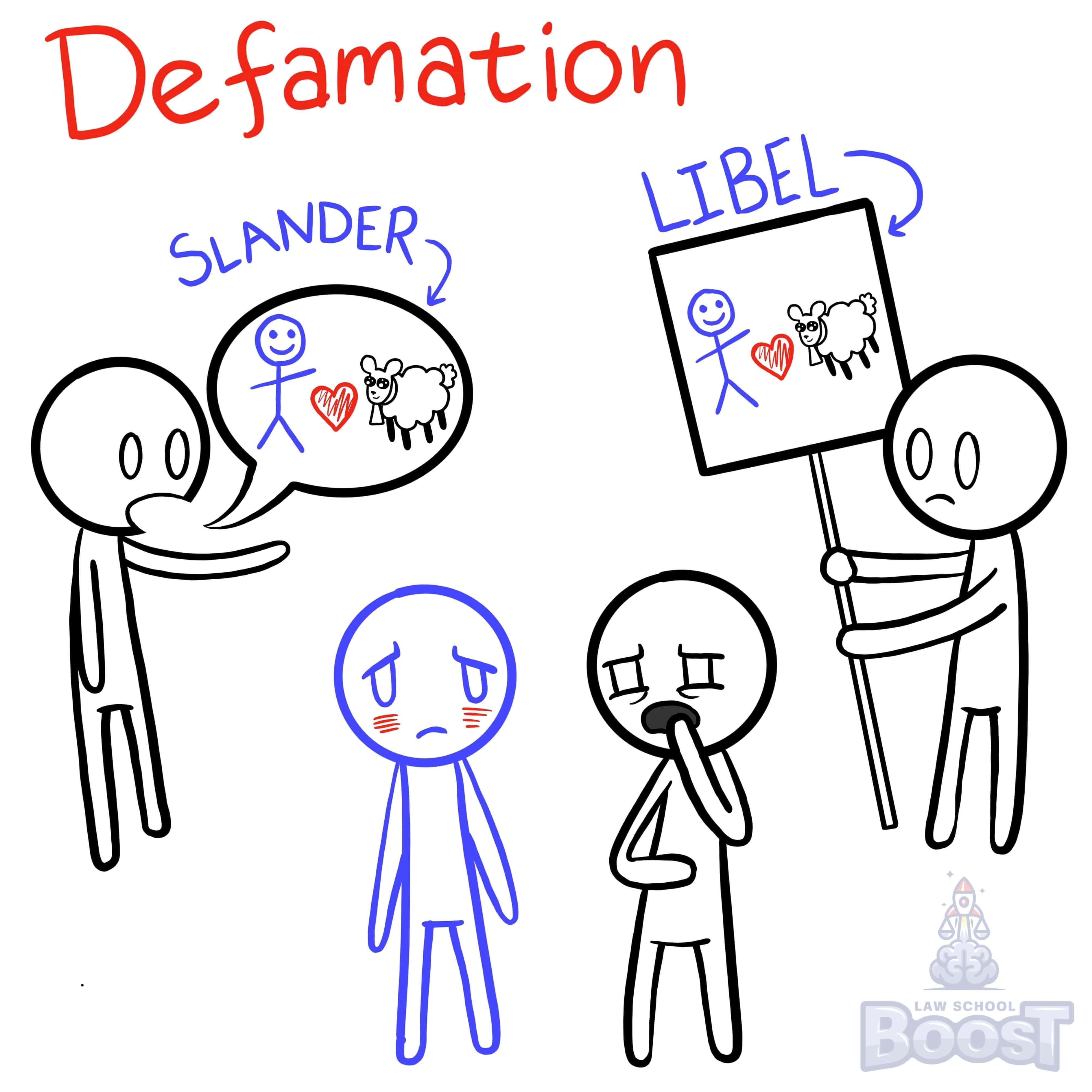👀
Torts • Defamation
TORT#086
Legal Definition
Slander per se is a defamatory statement that either: (1) adversely reflects a person's business or professional conduct; (2) claims a person has a loathsome disease; (3) claims a person committed a crime of moral turpitude, or (4) claims that a woman is unchaste or a man is important.
General damages are presumed and special damages need not be proven.
General damages are presumed and special damages need not be proven.
Plain English Explanation
Think of "slander" as being like inappropriate language, and "slander per se" as being like profanities. In other words, though all slanderous statements are bad, slander per se statements are so much worse that they are more harshly punished. For example, a victim of slander must show the court that they were actually damaged by the defamation. However, slander per se is so frowned upon that the law will presume damages exist.
Hypothetical
Hypo 1: Sam owns a restaurant and always adheres to health codes. Bob hates Sam. One day, Bob tells Sam that he thinks Sam spits in the food. Result: Bob's statement is defamatory, however, Bob only told it to Sam. To be defamation, Bob must communicate it to a third party (someone other than Sam). Telling Sam is no different than Bob yelling it into an empty chasm.
Hypo 2: Sam owns a restaurant and always adheres to health codes. Bob hates Sam. One day, Bob walks into the restaurant and yells, "Sam, the owner of this restaurant, spits in the food!" Result: Sam can sue Bob for defamation because Bob has made a statement that defames Sam and communicated it to third parties.
Hypo 3: Sam owns a restaurant and always adheres to health codes. Bob hates Sam. One day, while Bob is visiting Antarctica, he tells a random scientist, "Sam spits in the food." Result: Bob's statement is defamatory about Sam, and he communicated it to a third party, but the reality is that the random dude in Antarctica likely has no clue who Bob is talking about. There's a lot of Sam's in the world. So if, for some reason, Sam finds out about this conversation, he likely has no cause of action because his reputation never actually suffered.
Hypo 4: Sam owns a restaurant and always adheres to health codes. Bob hates Sam. One day, while walking outside of the restaurant, Bob points at Sam's restaurant and tells his friend, "Hey, the owner of that restaurant spits in the food." Result: Sam can sue Bob for defamation because even though Bob didn't specifically say Sam's name, his statement made it reasonably certain who he was talking about.
Hypo 5: Sam owns a restaurant called Sam's BBQ and always adheres to health codes. Bob hates Sam. One day, Bob buys a commercial slot on the local radio station that says "Sam spits in the food at Sam's BBQ." Many people, including Sam, hear the commercial. Result: Bob has committed defamation, but not slander. Rather, he committed libel, because the statement was not directly communicated verbally (it was recorded and played later).
Hypo 2: Sam owns a restaurant and always adheres to health codes. Bob hates Sam. One day, Bob walks into the restaurant and yells, "Sam, the owner of this restaurant, spits in the food!" Result: Sam can sue Bob for defamation because Bob has made a statement that defames Sam and communicated it to third parties.
Hypo 3: Sam owns a restaurant and always adheres to health codes. Bob hates Sam. One day, while Bob is visiting Antarctica, he tells a random scientist, "Sam spits in the food." Result: Bob's statement is defamatory about Sam, and he communicated it to a third party, but the reality is that the random dude in Antarctica likely has no clue who Bob is talking about. There's a lot of Sam's in the world. So if, for some reason, Sam finds out about this conversation, he likely has no cause of action because his reputation never actually suffered.
Hypo 4: Sam owns a restaurant and always adheres to health codes. Bob hates Sam. One day, while walking outside of the restaurant, Bob points at Sam's restaurant and tells his friend, "Hey, the owner of that restaurant spits in the food." Result: Sam can sue Bob for defamation because even though Bob didn't specifically say Sam's name, his statement made it reasonably certain who he was talking about.
Hypo 5: Sam owns a restaurant called Sam's BBQ and always adheres to health codes. Bob hates Sam. One day, Bob buys a commercial slot on the local radio station that says "Sam spits in the food at Sam's BBQ." Many people, including Sam, hear the commercial. Result: Bob has committed defamation, but not slander. Rather, he committed libel, because the statement was not directly communicated verbally (it was recorded and played later).
Visual Aids

Related Concepts
In assessing a defamation claim, what is actual malice?
In assessing a defamation claim, what must a plaintiff prove when a statement is a matter of public concern?
In assessing a defamation claim, what must a plaintiff prove when the issue is a matter of private concern?
In assessing a defamation claim, what must a plaintiff prove when they are a private person and the statement is a matter of public concern?
In assessing a defamation claim, what must a plaintiff prove when they are a public official or figure?
What is defamation?
What is libel?
What is libel per quod?
What is slander?
What may be used as defenses to a defamation claim?
When is absolute privilege a defense to defamation?
When is consent a defense to defamation?
When is qualified privilege a defense to defamation?
When is truth a defense to defamation?


